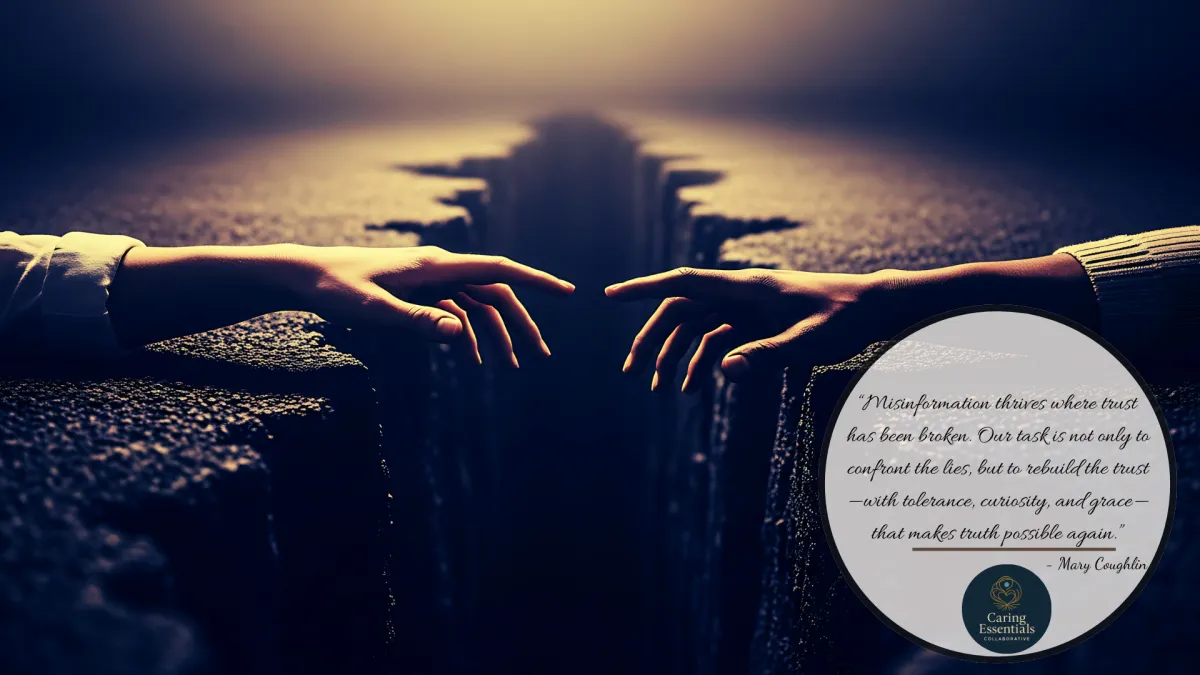
Fractured Trust, Fractured Nation: Choosing Tolerance in the Age of Misinformation
"Misinformation thrives where trust has been broken. Our task is not only to confront the lies, but to rebuild the trust—with tolerance, curiosity, and grace—that makes truth possible again." - Mary Coughlin
Fractured Trust, Fractured Nation: Choosing Tolerance in the Age of Misinformation
A Different Way: The BUFFER Approach
What We Can Do: Building Skills of Tolerance, Curiosity, and Grace
We are living in a time when the fractures in our civic life are showing up everywhere, at kitchen tables, in family group chats, even in the places where we most want to feel safe and connected. For many of us, the divisions aren’t just “out there” in the headlines, they’re close to home, shaping how we talk (or stop talking) with the people we love.
At the heart of this fracture is a collapse of trust. Decades of inequity, unkept promises, and systemic failures have created a vacuum where suspicion grows. And into that vacuum rushes misinformation, conspiracy theories, and the loud voices of leaders who profit from outrage more than from repair.
The current administration is capitalizing on this lack of trust—stoking fears, amplifying division, and framing neighbor against neighbor. The result is a citizenry pushed further apart, struggling to recognize one another across the widening gap.
Where Misinformation Thrives
Misinformation doesn’t just “happen.” It flourishes where trust has been broken.
Erosion of trust: When institutions consistently fail people, mistrust becomes the soil where conspiracies take root.
Exploitation of fear: Leaders who seek power through control weaponize that mistrust, creating enemies where there should be neighbors.
Algorithmic silos: Social media reinforces it, tailoring “truths” that harden our positions and feed suspicion of anyone outside (and sometimes inside) our feed.
This isn’t only a political problem. It’s a trauma problem. Misinformation preys on fear and amplifies our nervous system’s survival response—fight, flight, freeze and fawn.
A Different Way: The BUFFER Approach
Imagine if our leadership (and even our civic and personal lives) were grounded in trauma-informed principles rather than division. A BUFFER-oriented administration would practice:
Belonging: Building systems where people feel included, not discarded.
Understanding: Naming the roots of mistrust and listening deeply, instead of shaming those caught in falsehoods.
Forgiveness: Making space for people to return from harmful beliefs without humiliation.
Frameworks: Holding steady to transparent, principled decision-making rather than reactive rhetoric.
Equanimity: Meeting the turbulence of our times with steadiness, not outrage.
Respect: Honoring the dignity of every person, even across profound disagreement.
This is the opposite of what we see modeled now, but it’s not beyond reach.
What We Can Do: Building Skills of Tolerance, Curiosity, and Grace
We don’t have to wait for Washington to change. We can choose different skills in our own lives:
Discernment: Before sharing, ask: Who benefits from me believing this?
Curiosity: When faced with a view that feels foreign, try: Where did you hear that? Then listen without rushing to correct.
Boundaries: Not every falsehood deserves a fight. Sometimes the wisest response is disengaging with compassion.
Grace: Remember, most people aren’t driven by malice, they’re responding to fear.
These practices don’t erase disagreement. But they make room for something deeper: the possibility of staying in relationship even when we don’t see eye to eye.
Choosing the “We” Over the Fracture
The world is trying very hard to divide us. But our task, the work of citizens who care about democracy, about family, about our shared future, is to practice returning to one another. To resist the pull of fracture and instead build resilience through tolerance, curiosity, and grace.
We may not be able to change algorithms overnight. We may not silence the loud voices sowing division. But we can choose how we show up with one another. And that choice matters.
Reflection
Think about the next hard conversation you have, whether at home, online, or in your community. What would it look like to choose curiosity instead of judgment? To hold space for the relationship, even when you cannot share the same perspective?
In tolerance, curiosity, and grace,
Mary
